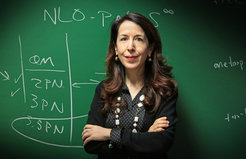Professor Alessandra Buonanno elected member of the Berlin-Brandenburg Academy of Sciences and Humanities
Buonanno is honored for her scientific achievements in gravitational-wave physics
At its last meeting in December 2020, the Council of the Berlin-Brandenburg Academy of Sciences and Humanities elected Alessandra Buonanno, Director at the Max Planck Institute for Gravitational Physics in Potsdam, as a member. The Academy Members have now confirmed this election. A. Buonanno will be officially welcomed into the Academy during a ceremony at the Konzerthaus am Gendarmenmarkt in Berlin on June 5, 2021.
“It is a special honor and a great pleasure for me to be elected to the Berlin-Brandenburg Academy of Sciences and Humanities,” says Alessandra Buonanno, head of the “Astrophysical and Cosmological Relativity” department at the Max Planck Institute for Gravitational Physics (Albert Einstein Institute) in Potsdam. “I have been doing research at an institute in Brandenburg for more than six years now, Berlin is my domicile of choice, and I am really delighted to become a member of this famous scholarly society!”

Alessandra Buonanno is a leading theorist in the field of gravitational-wave physics. Her work on waveform modeling has been essential in the detection of gravitational waves from binary systems composed of black holes and/or neutron stars, and the physical interpretation of the signals. In collaboration with Thibault Damour, she invented a novel approach to study the two-body problem in General Relativity, notably the effective-one-body formalism. Using this approach, they made the first prediction of the gravitational signal from a binary black-hole coalescence, including the analytical, approximated prediction of the merger signal. Such a formalism can also be used to measure, or constrain, the equation of state of neutron stars, whose inner core can reach supranuclear densities. Buonanno pioneered and greatly contributed to the successful synergistic approach of combining numerical-relativity techniques with analytical-relativity methods with the goal of developing the most accurate and efficient waveform models for gravitational-wave observations.
Alessandra Buonanno studied theoretical physics in Pisa, and held faculty positions in Paris and at the University of Maryland, where she became full professor in 2010. She is a Principal Investigator of the LIGO Scientific Collaboration. For her contributions to LIGO and Virgo discoveries, she was awarded several prizes, including the 2018 Gottfried Wilhelm Leibniz prize – the most prestigious research prize in Germany – and the 2021 Galileo Galilei Medal. She recently has been elected member of the German National Academy of Sciences Leopoldina, and of the US National Academy of Sciences. Buonanno is a Fellow of the International Society on General Relativity and Gravitation, and of the American Physical Society. She holds a research professorship at the University of Maryland, and honorary professorships at the Humboldt University in Berlin, and at the University of Potsdam.
The tradition of the Berlin-Brandenburg Academy of Sciences and Humanities goes back to the Society of Sciences and Humanities, which was founded in 1700 by Gottfried Wilhelm Leibniz under the Elector Friedrich III. From the beginning, it united the natural sciences and the humanities, thus distinguishing itself from its models in London and Paris, and in turn became the model for all the more recent academy foundations.
Today, the Berlin-Brandenburg Academy of Sciences and Humanities with its 378 elected members – outstanding representatives of their disciplines, including 80 Nobel Prize winners in the course of its history – is a scholarly association that crosses disciplinary and national borders.












